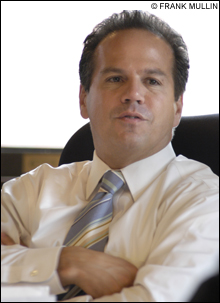With only token opposition this fall, the Providence mayor has serious triumphs and challenges

SECOND TIME AROUND: Cicilline’s relative success in making progress on tough issues like the schools and job-creation will influence his legacy.
|
As he heads into the home stretch of his first term, Providence Mayor David N. Cicilline couldn’t have asked for a better seal of approval. With a laudatory June 8 piece datelined out of Providence, Washington Post political columnist David S. Broder marveled, “Something remarkable is happening here. A city long known for the rackets and graft is being cleaned up by a reform-minded mayor.”
The column — written after Democratic media consultant Mandy Grunwald had encouraged Broder to check out Cicilline — offered a sketch in broad brushstrokes of the narrative now familiar to Rhode Islanders: how the liberal and openly gay son of a Catholic father and a Jewish mother twitted the conventional wisdom by scoring a decisive mayoral victory in 2002, emerging in the process as the new heavyweight of Providence politics.
Indeed, Cicilline’s place at the top of the pile can be seen in how he faces only token opposition for a second term. Another four years would allow the 44-year-old mayor the chance to expand upon his efforts so far, and possibly set the stage for a campaign for state or federal office. Among current elected officials in Rhode Island, only US Senator Jack Reed and US Representative James Langevin have a higher approval rating (65 percent) than Cicilline’s 59 percent, as measured in a poll conducted last month by Brown University political science professor Darrell West. (Adding some intrigue will be the expected reintroduction to Rhode Island of Vincent A. “Buddy” Cianci Jr., who is due to be released from federal prison in 2007. See “Return of the rogue.”)
A variety of observers interviewed by the Phoenix give Cicilline generally high marks for his efforts since coming into office in 2003. At the same time, Providence — like many cities — faces a number of onerous challenges, many of them rooted in how a high percentage of its residents live in poverty. While reforming city government is vital, it will represent just a partial victory if large swaths of Providence are left behind.
Here’s a look at Cicilline’s accomplishments and shortcomings during his first term as mayor:
The Best
Instilling a commitment to ethics in city government
When some of the leading lights from the state’s political community attended a recent Avon Theatre screening of the locally set Showtime series Brotherhood, the sense of verisimilitude was palpable. Although the show takes a page from the Bulger brothers of Massachusetts, the intersection of politics and criminality is an enduring staple, after all, in Rhode Island. And while corruption sometimes passes for entertainment — a practice personified most recently by Cianci’s second reign at City Hall — it doesn’t make for very good government.
Cicilline’s pledge to not accept campaign contributions from municipal employees helped to set the right tone, dispelling the familiar “I-know-a-guy-who-knows-a-guy” way of doing things. “I sense that the old ways have been broken,” says H. Philip West Jr., the executive director of Common Cause of Rhode Island, who served on an ethics panel assembled by the mayor. “Can I prove that? No.” But instead of the overly permissive atmosphere that once prevailed, West says, Cicilline has ushered in “not only an effort to comply with laws that are on the books, but to create new ones that would improve the ethical climate.”
These include proposals to create a position for a municipal integrity officer and to establish a municipal revolving-door prohibition to preclude city councilors from seeking city jobs in Providence. Although the City Council blocked both measures, the state Ethics Commission is slated to consider the latter proposal in August, West says. Cicilline is also credited with professionalizing the functioning of various city departments through the use of results-based analysis.
A police department that serves the community
Not that long ago, the Providence Police Department was caught in a dysfunctional cycle that ill-served residents, particularly in poor parts of town, and reflected badly on the department itself. Cicilline moved quickly to make a firm break with the past by choosing Dean Esserman, the kind of outsider needed to bring long-overdue change, as the department’s new chief.
Activists credit Esserman and his emphasis on community policing with dramatically improving how the city and the police are perceived on Providence’s South Side. There remains room for improvement in getting more officers to embrace the spirit of community policing. But one observer goes so far as to say that Esserman’s lack of tolerance for abuse, as well as a number of retirements within the department, have transformed what had been one of the bigger scars in the city into a badge of honor.
The providence political renaissance
While City Council president John J. Lombardi and other council critics fault Cicilline for what they call a lack of communication, the way in which all 15 council seats are being contested in elections this year speaks to a vivid new sense of openness in Providence’s body politic.